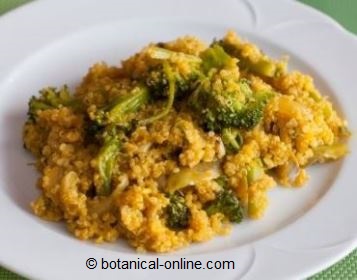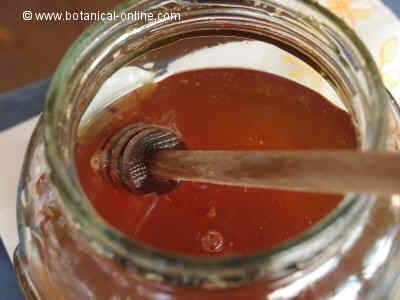Contents
- 1 Benefits of probiotic bacteria for intestinal flora
- 1.1 PROPERTIES OF PROBIOTICS AND THEIR BENEFITS
- 1.2 What are probiotics?
- 1.3 Are probiotic yoghurts good?
- 1.4 PROBIOTICS SUPPLEMENTS
- 1.5 What are supplements of probiotics and what are they used for?
- 1.6 Benefits of probiotics
- 1.7 Functions of probiotics
- 1.8 Does yogurt with probiotic bacteria cause dependency?
- 1.9 Contraindications of probiotics
Benefits of probiotic bacteria for intestinal flora
PROPERTIES OF PROBIOTICS AND THEIR BENEFITS
What are probiotics?
Probiotics are living organisms that, when taken in certain quantities, can provide health benefits.
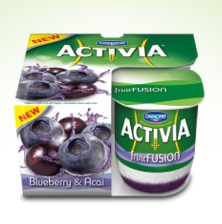 Photo of bifidus yogurt. The bifidus yogurt contains lactic ferments (Lactobacillus), and active bifidus (Bifidobacterium). Both are probiotics, that is to say, healthy intestinal bacteria. |
Probiotic foods are those that contain healthy bacteria in high doses for body health. These bacteria are like those we already have naturally in the gut.
The best known are the lactobacillus and bifidobacteria, which are found in yogurts and fermented cheeses.
Some yogurts as bifidus yoghurt, besides lactic ferments (Lactobacillus), also contain those of bifidus (Bifidobacterium).
Kefir contains lactic bacteria such as yogurt but, in addition, it also contains yeast and acetic acid bacteria. These microbes are glued to a polysaccharide matrix (kefir grains or yogurt promoters).
Probiotics must be accompanied by a diet rich in vegetables, as they feed on the fiber a diet should contain. Without a proper diet, these foods are not functional.
Are probiotic yoghurts good?
Despite the above, experts believe that yogurts and probiotic foods can not actually be considered to have probiotic properties.
That a food contains probiotics does not mean it will have a probiotic effect on the body. That is, though containing healthy bacteria, probiotics are not considered good because during digestion much bacteria in food die, because these bacteria do not resist stomach acid.
You can only claim that a food is probiotic when demonstrated in studies. Kefir prebiotic effect has been demonstrated if taken daily (250ml).
In general, the only way to ensure sufficient supply of bacteria which can arrive intact in the intestine is taking good probiotic supplements. |
PROBIOTICS SUPPLEMENTS
What are supplements of probiotics and what are they used for?
Probiotic supplements are capsules containing live microorganisms and, if taken in certain quantities, have shown to improve the composition of the microbiota or gut flora and provide health benefits.
Mainly probiotics are administered to improve the composition of the microbiota or gut flora or to alleviate some side effects of medication.
For example, your doctor may recommend probiotics when treatment with antibiotics, which can weaken the intestinal microbiota. In this case, when taken together with antibiotic treatment, it is recommended to wait 2 hours between taking the antibiotic and the probiotic supplement.
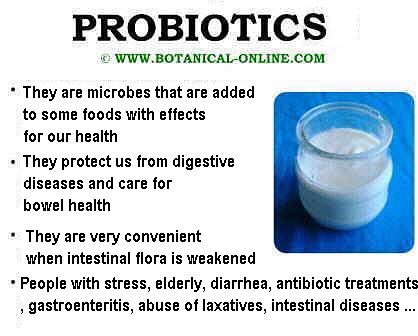
Main properties of probiotics.
Benefits of probiotics
These foods are highly recommended when the intestinal flora is weakened or altered (intestinal dysbiosis).
This happens if:
There are many products with probiotics, but not all are effective
– Poor diet poor in carbohydrates and vegetables.
– Stress
– Celiac disease or gluten allergy (choose nondairy probiotics if lactose intolerance, such as soy yogurt)
– Changes in diet such as travel, vacation or trips to countries eating other than ordinary food.
– Old age
– Treatment with antibiotics
– Intestinal infections or gastroenteritis
– Diarrhea
– Abuse of laxatives
– Intestinal diseases such as pancreatitis, diverticulitis, Crohn’s disease or irritable colon.
Functions of probiotics
– Prevent bowel disease: When there are cases when the intestinal flora is altered, foods with probiotics help maintain healthy intestinal flora and thus prevent intestinal infections.
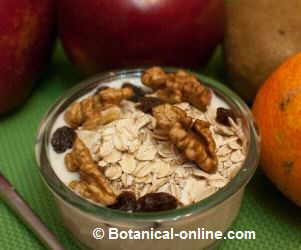 Photo of yogurt with oats, nuts and raisins. It’s a good combination because the fiber of plant food is prebiotic, it promotes the growth of healthy bacteria |
If the intestinal flora is healthy, it is able to balance itself. For example, a diet rich in vegetable fibers will feed a type of healthy bacteria that will proliferate naturally (the so-called aerobic bacteria).
But if a diet low in fiber and rich in meat products is carried out, flora may be weakened. This makes the intestinal rhythm to slow down. Putrefactive gases and heterocyclic amines, which are harmful to intestinal health, can form. In this case, the number of enterobacteria (anaerobic bacteria) as Candida albicans increases.
The increase of Candida albicans in the gut if there is not good hygiene, can produce a vaginal infection such as candidiasis.
Take food with probiotics, such as yogurt, if you are prone to candidiasis.
– Reinforce the defenses: The immunomodulatory properties of probiotics have been scientifically proven. (More information).
– Flatulence: Probiotics foods help reduce discomfort by gases that cause very high fiber foods, such as legumes and vegetables rich in fiber. Take a yogurt for dessert after eating chick peas or artichokes to prevent bloating.
Does yogurt with probiotic bacteria cause dependency?
No, foods with probiotics do not cause dependence.
They can not cause dependence because they are not components that our body can produce, but bacteria found naturally in food.
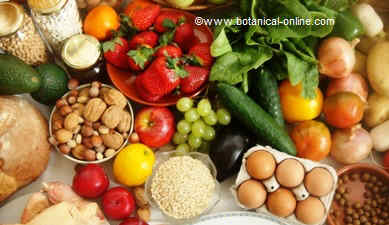 A healthy diet benefits natural proliferation of healthy bacteria. |
Also, it has to be emphasized that probiotic foods, such as yogurt, miso, kefir, etc., provide intestinal bacteria, but they do not do their function if they are not accompanied by fiber.
Therefore, even if a person takes yogurt for defenses, he/she should need to take some prebiotic (plant fiber) to nurture and encourage the proliferation of these bacteria.
Contraindications of probiotics
Who should NOT take probiotics or lactic bacteria?
– Probiotics may interfere with medication for autoimmune diseases, AIDS, cancer, lupus, etc.
– Probiotic supplements should not be taken in pregnancy or lactation (Consult your doctor).
*Related information:
– Importance of Diet: Prebiotics
– The use of sweeteners modifies the intestinal flora
![]() More information on probiotics.
More information on probiotics.


